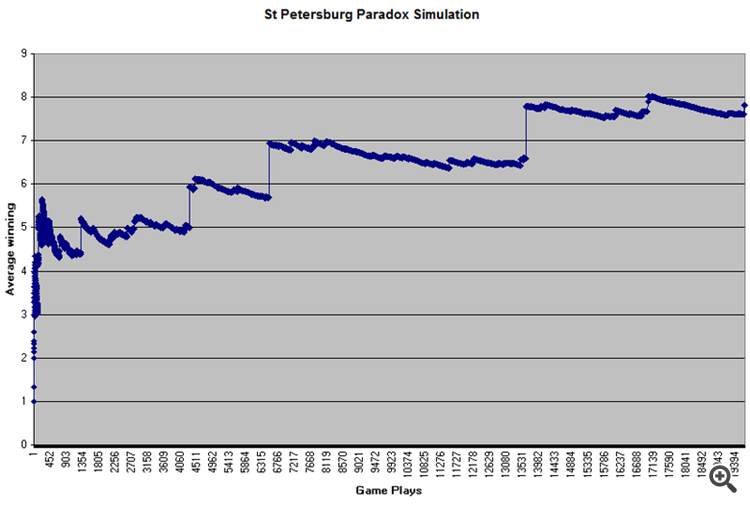You are missing trading opportunities:
- Free trading apps
- Over 8,000 signals for copying
- Economic news for exploring financial markets
Registration
Log in
You agree to website policy and terms of use
If you do not have an account, please register
here, I've done the math.
for 100,000 games it's a number of 8.32 roubles.
for a million games this number is 25.76 roubles.
The more games, the higher the number.
It's like martingale: the more games you play, the higher the probability of losing.
Help me with the file from this post, I can't figure it out, column D has the formula =A(A1)
Mathematical puzzles and fun
This book by famous American science popularizer M. Gardner has a lot of very entertaining problems and puzzles from different branches of mathematics. A successful selection of material, a completely unusual form of presentation and subtle humor of the author will bring great pleasure to a wide range of readers - maths lovers who want to usefully spend their free time
Thank you, Oleg, impressive))
to get a random number between 0 and 6 (one out of 7):
- consider limit=RAND_MAX - (RAND_MAX%7) ; the maximum multiple of 7 in the range 0...RAND_MAX
- use RDS until we get r<limit; i.e. if "random number" is higher than limit, we can't do anything with it - we take
- result = r % 7 or (for better or worse) r * 7 / limit
something like this :-) might be wrong +-1,
In our case RAND_MAX = 32767 is divided by 7 without remainder, so your example is not very good. If we consider a general case, we will get probability skew in favor of numbers larger than the remainder.
That is, if say RAND_MAX%7 = 4, we will more often get 5 and 6. That's why nothing should be discarded. Everything must be taken into account.
here, I've done the math.
for 100,000 games, the number is 8.32 roubles.
for a million games, the number is 25.76 roubles.
The more games, the higher the number.
It's like martingale: the more you play, the higher the chance of losing.
The point of the game: to enter the game a deposit is needed and the coin game lasts until the first eagle appears (a one-time game), 1-doucat wins when an eagle appears in the first roll, if there was a tails and an eagle appears in the second roll, the winning amount is doubled, and so on to infinity, until an eagle appears. Probability of winning 1 ducat 0.5, 2-0.25, 4-0.125, etc. Hence, it is possible to win infinity, and play infinity, if the bank sum is infinite.
Forum on trading, automated trading systems and testing of trading strategies
The St. Petersburg Phenomenon. The paradoxes of probability theory.
Novaja, 2018.10.24 10:02
The meaning of the game: to enter the game you need a deposit and the coin game lasts until the first eagle appears (a one-time game), 1-double win when eagle appears in the first roll, if there was tails and eagle appeared in the second roll, the win amount is doubled, and so to infinity, until eagle appears. Probability of winning 1 ducat-0.5, 2-0.25, 4-0.125 etc., so you can win infinity, and play infinity, if the pot is infinite.
Help me with the file from this post, I don't understand column D, it has the formula =A(A1)
In short, it counts on which drop an eagle has fallen.
What if you think about it?
How about not writing meaningless posts?